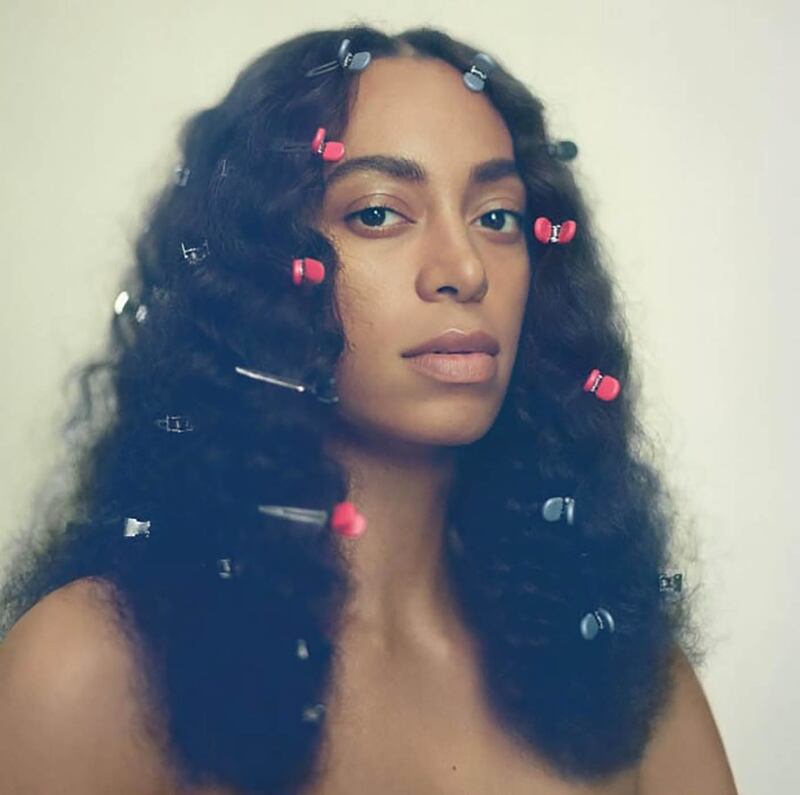Solange Knowles’ third full-length effort, A Seat at the Table, dropped not with a Lemonade-style bang, but with a whisper. A week ago, Solange launched a new website, inviting devotees to sign up for a chance to be one of 86 people to get “A seat at the table.” Those fleet-fingered fans received a limited-edition hardcover book, complete with album lyrics, scattered poetry, photos shot by Carlota Guerrero, and blank pages.
Scrolling through the book online, even robbed of the ability to flip through physical pages, the famously independent singer-songwriter’s vision shines through. Every white space, lyrical turn, and aesthetic decision feels deliberate. As is the case with the best, long-awaited works, one immediately understands that the artist has taken exactly as much time as they needed—not one year more, nor one second less. This creative control extends to the accompanying album, a 21-track experience that Solange has described as “a project on identity, empowerment, independence, grief, and healing.”
With her longest list of collaborators yet, A Seat at the Table shows off a tonal range that other artists can’t touch. From Lil Wayne to Dev Hynes to Q-Tip to Kelly Rowland to Sean Nicholas Savage, the breadth and depth of Solange’s influences mirror the wide reach of her poetry. A Seat at the Table, both the book and the album, defy easy comprehension—luckily, they’re beautiful enough on first glance to appease both diehard fans and surface skimmers. Sweet and clear, Solange’s voice inarguably shares her sister’s DNA. But Solange uses her instrument in distinct ways, weaving together synthetic funk, electronic pulses, and woven vocals to hypnotic effect.

From the second track, “Weary, which opens, “I’m weary of the ways of the world,” A Seat at the Table wears its politics proudly. “And do you belong? I do,” an essay Solange published earlier this year about black bodies living in white spaces, echoes throughout the album. There’s the exhaustion with always being treated differently, and the anxiety of being constantly on guard. In the essay, she wrote, “You and your friends have been called the N-word, been approached as prostitutes, and have had your hair touched in a predominately white bar just around the corner from the same venue.” On “Don’t Touch My Hair,” she croons, “Don’t touch what’s there / When it’s the feelings I wear / They don’t understand / What it means to me.”
Songs like “Don’t Touch My Hair” might strike certain listeners as containing some harsh, confrontational truths. They are not mistaken. In a recent interview, Solange explained, “I think that A Seat at the Table for me is an invitation to allow folks to pull up a chair, get very close and have these hard uncomfortable truths be shared. It’s not going to be pretty, it’s not going to be fun, you may not get to dance to it, you’re not going to breathe easily through it, but that is the state of the times that we’re in right now.” This album unapologetically lives in a racial divide that it cannot, and will not, bridge—it’s not here to lecture or enlighten the people who “don’t understand.” Or as Solange puts it succinctly on “F.U.B.U.,” “Don’t feel bad if you can’t sing along / Just be glad you got the whole wide world.”
The eighth track on the album, “F.U.B.U.” couldn’t be clearer: “This shit is for us / All my niggas let the whole world know / Play this song and sing it on your terms.” It’s a crescendo and a mission statement, informed and aided by the spoken interludes that came before it. On “Dad Was Mad,” Mathew Knowles describes decades’ worth of anger, stemming from his experience as one of the first young black students to integrate a Southern school. Tina Knowles pipes in later to say that “there’s such beauty in black people” adding, “It really saddens me when we’re not allowed to express that pride in being black.” Rapper and entrepreneur Master P chronicles some of the potential pitfalls of growing up black, warning, “Black kids have to figure [it] out—we don’t have a rehab to go to. You gotta rehab yourself.” A Seat at the Table is its own brand of rehab—a response to anger and weariness that seems set on joy and self-love in spite of it all.
A Seat at the Table invites two lazy-but-apt comparisons—to Beyoncé’s Lemonade, and to Frank Ocean’s Blonde. Blonde, another highly-anticipated, recent release from a painstaking artist, similarly manifested as both an album and a magazine. Both projects aren’t easily designated to one genre, and boast collaborators across the realms of hip hop, R&B, pop, indie rock and electronica.
Lemonade, in addition to being the brainchild of Solange’s own sister, is also a meditation on black womanhood, love, and tenacity. Of course, Beyoncé and Solange are very different artists. Beyoncé is one half of hip-hop’s royal couple, and arguably the greatest living pop star. Her fan base is mammoth and her work is universal, if not universally beloved. Perhaps due to her wide-reaching audience, Beyoncé often seems to be creating in broad strokes. Her political allegiance to the Black Lives Matter movement, and her dedication to highlighting black beauty and black experiences through her art, particularly on Lemonade, is undeniable.
But like any unfathomably famous person, Beyoncé keeps breathing room between her personal life and her public projection. To some people, Lemonade is proof that Jay Z was stepping out on his wife. To others, it’s an amalgam of experiences of black womanhood—an artistic expression, not a personal admission. Meanwhile, A Seat at the Table is so clearly under Solange’s skin. She works in fine personal details, sourcing family histories and sharing anecdotes. When Solange sings to the tune of what sounds like a human heartbeat, she’s not leaving much to interpretation—A Seat at the Table is, from the very beginning, her story. By the end, it’s a big, political, thorny thing of beauty.
When it comes to summing up A Seat at the Table, nobody does it better than Solange herself. “With the state of our country and all of the messages that we are constantly being fed about not being good enough, not being beautiful enough, not being smart enough, not having the economic power enough, and constantly being told that we’re not enough, I wanted this to literally be an hour long PSA that we are beyond enough,” she explained. “That we have always been and we are not asking for your permission. We are building our own.”





